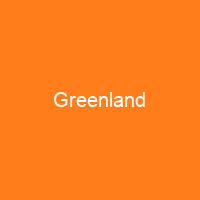Greenland: A Land of Ancient History and Modern Challenges
Imagine a vast, icy expanse where time seems to stretch back thousands of years—this is Greenland. Nestled between the Arctic and Atlantic Oceans, this autonomous territory in the Kingdom of Denmark has a rich tapestry of history, culture, and environmental challenges. Could you ever imagine that beneath its frozen surface lies a story spanning over 4,500 years?
The Inhabitants of Greenland
Greenland is home to the Kalaallit people, who are descendants of the Inuit. For centuries, these resilient inhabitants have navigated the harsh Arctic landscape, adapting their way of life to survive in one of Earth’s harshest environments. The Norsemen arrived much later, settling the island in the 10th century and sharing it with the indigenous peoples for a brief period before disappearing mysteriously.
The Norse Settlements
Imagine the Norse settlements as small pockets of civilization amidst an otherwise uninhabited wilderness. These settlers thrived for centuries but eventually vanished, leaving behind only whispers in Icelandic sagas and archaeological evidence. The exact reasons for their disappearance remain a mystery, with theories ranging from climate change to conflicts with the indigenous peoples.
Greenland’s Climate and Geography
The climate of Greenland is as unpredictable as its history. With temperatures fluctuating between 1 and 9°C (22.8 to 49.8°F), it’s a land where extremes reign supreme. The ice sheet, covering over 75% of the island, holds enough water to raise global sea levels by several meters if fully melted—a scenario that could dramatically reshape our world.
The Ice Sheet and Sea Level Rise
Greenland’s ice sheet is not just a frozen landscape; it’s a ticking time bomb for coastal cities worldwide. As the planet warms, this vast expanse of ice is melting at an alarming rate. The consequences are dire: sea levels could rise by several meters if all the ice were to melt, threatening millions of lives and billions in property.
Greenland’s Political Status
Greenland’s political status has evolved significantly over time. From a Danish colony to an autonomous territory with increasing self-governance, its journey is marked by a blend of cultural preservation and modernization. The relationship between Denmark and Greenland remains complex, with ongoing debates about sovereignty and the future direction of this unique land.
The Future of Greenland
As climate change continues to impact Greenland, so too does it affect the world at large. The island’s political status is not just a local issue; it has global implications for environmental policy and international relations. Will Greenland continue its path towards greater autonomy or seek full independence? Only time will tell.
Economy and Society
Greenland’s economy is heavily reliant on financial aid from Denmark, with fishing being the primary industry. However, the country also has significant mineral resources that could potentially transform its economic landscape if extracted sustainably. Education and healthcare are key areas where the government aims to improve living standards while preserving cultural heritage.
Education and Healthcare
Educational policies in Greenland aim to integrate Greenlandic and Danish languages, reflecting a blend of traditional and modern influences. The country faces significant social challenges, including high rates of suicide and alcoholism, which are being addressed through targeted initiatives. LGBTQ rights have made considerable progress, with anti-discrimination laws now in place.
Culture and Arts
Greenland’s culture is a rich blend of Inuit traditions and Scandinavian influences. Art forms such as tupilaks (spirit objects) and modern carvings from walrus ivory showcase the ingenuity of its people. The national dish, suaasat, reflects the island’s reliance on marine resources, while traditional music features the drum, used for both performance and ritual.
Media and Entertainment
The public broadcasting company Kalaallit Nunaata Radioa plays a crucial role in disseminating information and preserving cultural heritage. The country boasts a vibrant music scene with popular bands like Sumé and Chilly Friday, contributing to its cultural identity. Traditional Inuit music continues to thrive alongside modern genres.
Conclusion
Greenland is more than just an icy island; it’s a land of ancient history, resilient people, and pressing environmental challenges. As the world grapples with climate change, Greenland stands at a crossroads, facing decisions that will shape its future for generations to come.

You want to know more about Greenland?
This page is based on the article Greenland published in Wikipedia (retrieved on March 11, 2025) and was automatically summarized using artificial intelligence.




